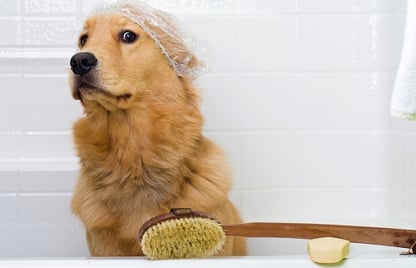Winter is hard on skin – for humans and for our pets. Indoor heat and cold arid air outside make skin dry and itchy. Many owners are unsure about the best way to keep their pets comfortable in winter. The solution is to keep up regular grooming schedules.

Following are answers to some of the most often-asked questions about winter skin care.
Q. Should pets be bathed during the winter?
A. Yes! A clean pet is a healthy pet. Regular shampooing and brushing during the winter months keep the skin and coat healthy. Follow the shampoo with a conditioning and moisturizing rinse. The drying process is key, because leaving dampness at skin level can cause problems. A short coat might be fine with just a vigorous toweling, but longer hair needs separating with comb or brush and plenty of airflow. Be very careful with your home hair dryer: use the lowest heat setting and keep it moving to prevent burns. (Professional groomers are equipped with high volume, low heat machines to dry quickly and safely.)
Q. Should I leave my pet’s hair long in winter to keep him warm?
A. If you decide to leave the coat longer, be prepared to brush often to prevent matting. Tangles form fast and trap moisture, a major cause of skin problems. Matted hair is not comfy and warm, but air trapped in layers of a well-brushed coat is effective insulation.
Maintain the same haircut schedule year round for breeds that require regular trimming. Your groomer can keep the style longer than in the summer, but allowing hair to “grow in” all winter can necessitate a drastic ‘short shave’ in spring.
If you’re concerned about your pet being cold when he’s outdoors, a sweater or fleece coat is a better option than letting his coat grow long and unruly.
Q. My dog seems to itch a lot more during the winter. What can I do?
A. With windows closed and heaters on, low humidity indoors will dry pet's skin. Counteract this with regular brushing to stimulate and spreads the natural oils.
Medicated shampoos and soothing moisturizing conditioners help if your pet’s skin seems itchy or scaly. Consult a professional groomer or veterinarian for recommendations. Nutrition is also important for skin health; omega oils in food or as a supplement is good.
Q. Why do my pets nails seem grow faster in the winter?
A. When dogs have fewer hours of exercise, nails can become overgrown because they are not being worn down with normal activity. Claws may need more frequent attention during the winter months. The ideal time is after the shampoo, while soft. Nails should barely touch the ground when the dog is standing. While clipping, check for hair between the pads that form uncomfortable lumps, and trap snow and ice.
House pets need regular grooming for health and hygiene. Don’t skip tasks – like nail clipping and tangle removal – just because they are difficult. If there are things you cannot or do not want to undertake yourself, seek the help of a professional. Your pet will be happier and more comfortable.




